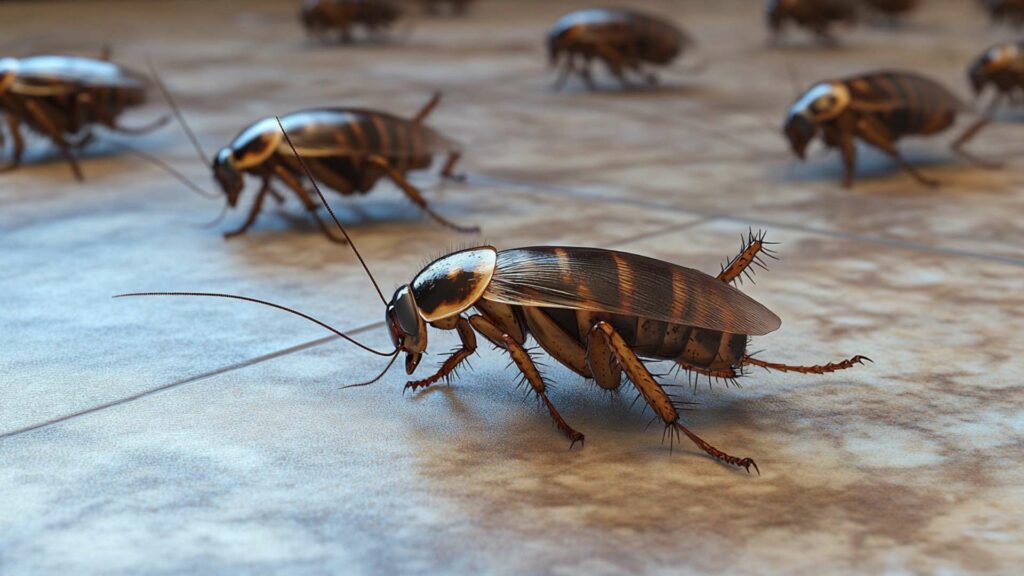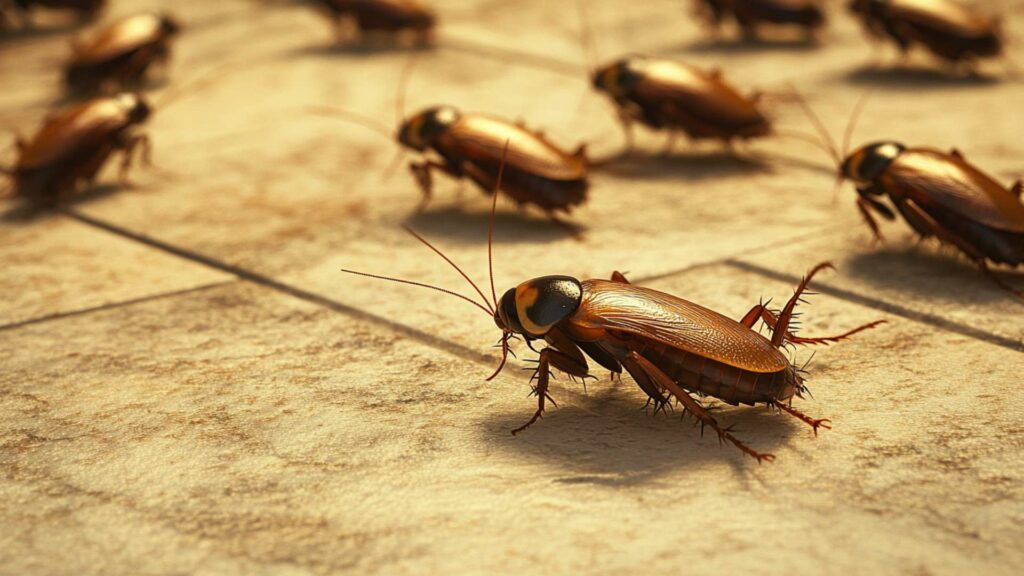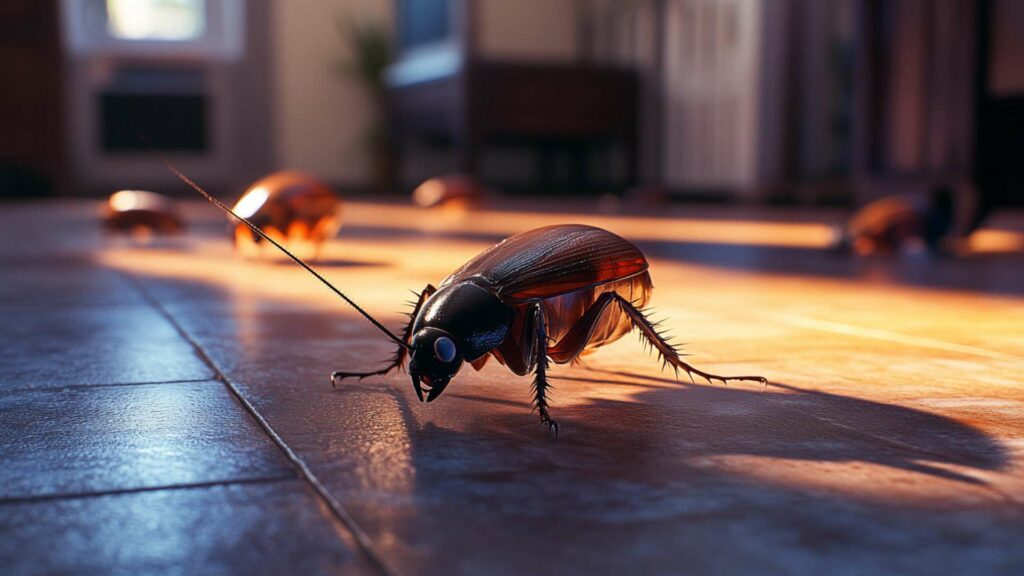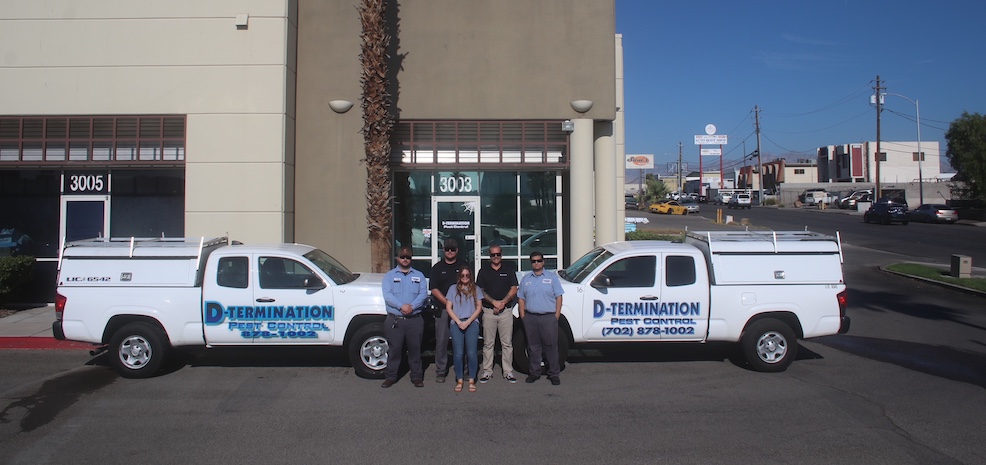Welcome, dear readers, to a fascinating exploration into the world of pest control. Today, we delve deep into the realm of roaches and an intriguing method that has caught the attention of many: rubbing alcohol.
Now, as you may know, rubbing alcohol is a common household item found in medicine cabinets and first aid kits. But have you ever wondered if this seemingly harmless liquid could also be an effective weapon against our six-legged foes?
Proactive Roach Defense! Arm yourself with knowledge on effective roach prevention and exclusion methods and safeguard your home from infestations.
Brief Explanation of Rubbing Alcohol

Before we embark on our quest for knowledge, let’s take a moment to understand what exactly rubbing alcohol is. Known by its scientific name as isopropyl alcohol (IPA), rubbing alcohol is a colorless and highly volatile liquid commonly used for both medical and household purposes.
It possesses excellent antiseptic properties that make it ideal for disinfecting wounds or sterilizing surfaces. Rubbing alcohol typically contains around 70% to 99% isopropyl alcohol mixed with water.
This high concentration ensures its effectiveness in killing bacteria and other microorganisms on contact. However, what has piqued the curiosity of many homeowners facing roach infestations is whether this potent substance can also deter or eliminate these resilient creatures.
Intriguing Question: Can Rubbing Alcohol Be an Effective Roach Killer?
Now here’s a thought-provoking question: Can you use rubbing alcohol to kill roaches? Picture this: You spot those pesky critters scurrying across your kitchen counters or lurking in your bathroom corners.
Instead of reaching for traditional insecticides or calling in exterminators to deter roaches right away, could it be possible to vanquish them using a simple bottle of rubbing alcohol? The idea that rubbing alcohol kills roaches isn’t entirely far-fetched.
After all, rubbing alcohol’s potent properties and ability to evaporate quickly could potentially inflict havoc on these unwanted guests. But before we jump to conclusions, let’s delve deeper into the science behind roach control and explore the viability of rubbing alcohol as a powerful weapon in our battle against these resilient insects.
Understanding Roaches
The Hidden World of Cockroaches: Unveiling Common Species and Their Habits
Cockroaches, those resilient and dangerous pests that send shivers down our spines, encompass a diverse group of species with intriguing habits. Among the most common roach species, we find the American cockroach, German cockroach, and Oriental cockroach. The American cockroach is a large reddish-brown insect known for its ability to fly.
It typically dwells in warm and moist environments such as basements and sewers. On the other hand, the German cockroach is smaller in size but more prolific in reproducing.
It thrives in kitchen areas due to its affinity for food sources and warmth. There’s the Oriental cockroach known for its dark coloration and preference for damp places like bathrooms.
The Perils of Roach Infestations: A Notorious Nuisance
While it may be tempting to dismiss roaches as simply unpleasant insects, their presence poses significant risks. Cockroaches are notorious carriers of disease-causing bacteria such as Salmonella, E.coli, and various allergens.
These pathogens can contaminate surfaces or food sources they come into contact with, posing health hazards to humans if ingested. Moreover, roach infestations can trigger or exacerbate respiratory issues like asthma due to the allergens present in their droppings and shed skin.
Beyond health concerns, roach infestations can also tarnish one’s living conditions and reputation. The sight of scurrying roaches can evoke discomfort and disgust among residents or visitors alike.
In addition to structural damage caused by dead cockroaches by their gnawing tendencies on materials such as paper, cardboard, and fabrics – which they might use for nesting – these pests can negatively impact our overall sense of well-being. As we delve further into the realm of cockroaches and their connection to rubbing alcohol, we shall explore whether this household solution can indeed provide respite from these persistent pests.
The Science Behind Rubbing Alcohol’s Effectiveness
Disruption of the Insect’s Cell Membranes: A Lethal Blow
When it comes to combating the persistent pests known as roaches, rubbing alcohol proves to be a formidable weapon. But how does this seemingly ordinary household item manage to exterminate these pesky insects? The answer lies in its ability to disrupt the delicate cell membranes of roaches and other insects.
You see, rubbing alcohol contains compounds like isopropyl alcohol or ethanol that have potent antimicrobial properties. When sprayed on a cockroach, the alcohol molecules penetrate through its exoskeleton, infiltrating the insect’s body.
Once inside, they attack and destabilize the cell membranes of various vital organs within the roach’s body. Imagine rubbing alcohol as a microscopic warrior invading a fortress, swiftly dismantling its defenses.
By breaking down these crucial barriers within the insect’s cells, rubbing alcohol cripples their ability to maintain proper physiological functions. As a result, crucial processes like respiration and osmoregulation are disrupted, causing chaos at an internal level for these uninvited guests.
Dehydration Caused by Alcohol’s Evaporation Properties: A Battle Unseen
While disrupting roaches’ cell membranes is undoubtedly effective in killing them, there’s another silent assassin lurking behind spraying rubbing alcohol’s effectiveness: dehydration. You may not realize it at first glance; however, rubbing alcohol possesses evaporation properties that accelerate water loss in exposed organisms like insects. Once sprayed onto a cockroach or any other insect for that matter, the volatile nature of rubbing alcohol causes it to quickly evaporate from their bodies.
This rapid evaporation process results in moisture loss from their external surfaces and leads to severe dehydration for our unwanted six-legged intruders. As roaches succumb to dehydration caused by rubbing alcohol exposure, they find themselves in a desperate race against time to replenish the lost fluids, often resulting in their untimely demise.
The science behind rubbing alcohol’s effectiveness as a roach killer is multifaceted. Its ability to disrupt cell membranes and induce dehydration plays a crucial role in exterminating these resilient creatures.
However, it is essential to exercise caution when using rubbing alcohol for pest control purposes, especially considering its flammable nature. With proper application and understanding of its limitations, rubbing alcohol can indeed prove to be an effective tool in your battle against cockroach infestations.
Using Rubbing Alcohol to Combat Roaches

Safety Precautions When Dealing with Roach-Infested Areas
When it comes to battling a roach infestation, it is essential to prioritize safety. Roaches are not only unwelcome household pests but can also carry diseases and allergens that pose risks to animals and human health.
Therefore, before engaging in any roach control measures involving rubbing alcohol, it’s crucial to take the necessary precautions. First and foremost, protective gear should be worn when dealing with roach-infested areas.
This includes wearing gloves and a mask to prevent direct contact with both the dead roaches, and the rubbing alcohol solution. Gloves act as a barrier between your skin and the potentially harmful substances found in roach excrement or carcasses.
A mask helps filter out any fumes that may be emitted when using rubbing alcohol or handling affected areas. Furthermore, proper ventilation is vital when working in enclosed spaces where roaches tend to hide.
Opening windows and using fans will help dissipate any fumes or odors associated with rubbing alcohol use. Adequate ventilation ensures that there is no build-up of potentially toxic or harmful vapors, creating a safer environment for both you and your household.
Applying Rubbing Alcohol Directly to Kill Roaches on Contact
One effective method of using rubbing alcohol to kill and against roaches is by directly applying it to kill them on contact. To do this, prepare a solution by diluting rubbing alcohol with water in a spray bottle or misting device.
The recommended concentration for maximum effectiveness is typically one part rubbing alcohol to one part water (1:1 ratio). It’s important to target areas where roaches are commonly found—cracks, crevices, baseboards—since these are their preferred hiding spots.
Spray or mist the affected areas generously with the prepared solution until they are damp but not dripping. The goal is to saturate the roaches with the rubbing alcohol mixture, which disrupts their cell membranes and ultimately kills them.
However, caution must be exercised when using spray alcohol in this method. Rubbing alcohol is highly flammable, so it’s crucial to keep it away from open flames or sources of ignition.
Additionally, while rubbing alcohol can be an effective tool against roaches, it should not be solely relied upon for complete eradication. Combining its use with other methods such as traps or baits will provide a more comprehensive approach to roach control.
By taking appropriate safety precautions and applying rubbing alcohol directly to affected areas where roaches hide, you can effectively combat a roach infestation. Just remember to exercise care due to the highly flammable nature of rubbing alcohol and consider using additional pest control measures for optimal results in eliminating these unwelcome pests from your home.
Limitations and Considerations
Effectiveness against different stages of roach development (eggs, nymphs, adults)
When it comes to using rubbing alcohol as a roach-killing solution, it’s important to understand its limitations. While rubbing alcohol can be effective in killing adult roaches on contact, its efficacy against eggs and nymphs is generally lower.
Roach eggs are protected by a thick protective casing which makes them less susceptible to the drying effects of alcohol. Nymphs, on the other hand, have softer exoskeletons compared to adults, which makes them more vulnerable but still not as susceptible as fully-grown roaches.
Potential drawbacks and limitations of using rubbing alcohol as a sole solution for infestations
Although rubbing alcohol does have some effectiveness in killing roaches, it is crucial to recognize that it should not be relied upon as the sole solution for an infestation to prevent roaches. One drawback of using rubbing alcohol is that it evaporates quickly and may not reach all hidden areas where roaches reside.
Additionally, while rubbing alcohol may kill some visible roaches on contact, it does not address the root cause of the cockroach infestation, or eliminate hidden nests. Therefore, a comprehensive approach incorporating other methods is necessary for long-term control.
Alternative Approaches to Roach Control

Integration with other methods such as traps or baits for comprehensive control
To enhance the effectiveness of rubbing alcohol in controlling roaches, integration with other methods is highly recommended. Combining traps or baits with the use of rubbing alcohol creates a more comprehensive approach that targets both visible and hidden populations.
Traps can attract and capture roaming roaches while baits lure them with enticing food sources containing insecticides that are carried back to their nests. This combination ensures greater success by eradicating roaches not only on surfaces but also in their nesting areas.
Professional pest control options for severe infestations
For severe roach infestations that prove difficult to manage, it may be wise to seek professional pest control services. Pest control professionals have the knowledge, experience, and access to more potent insecticides that can effectively eliminate roaches in large numbers.
They will conduct a thorough inspection of your home to locate nests and identify possible entry points, then implement targeted treatments to eradicate the problem at its source. Professional assistance is especially crucial when dealing with highly resilient species or when infestations have reached unmanageable levels.
Lesser-known Facts about Roaches and Rubbing Alcohol
Historical use of alcohol-based solutions in pest control practices
The use of alcohol-based solutions as a means of pest control dates back centuries. In older times, people used various types of alcohol, such as whiskey or brandy, mixed with other substances like boric acid, as natural insecticides.
The volatile fumes from these alcoholic mixtures were employed to repel or kill cockroaches and other pests. While rubbing alcohol is now more commonly used due to its high effectiveness and accessibility, the historical use of alcohol-based solutions underscores the enduring recognition of alcohol’s potential as a roach deterrent.
Conclusion
While rubbing alcohol can be effective in killing adult roaches on contact due to its ability to disrupt their cell membranes and cause dehydration upon evaporation, it does have limitations. It may not be equally effective against eggs and nymphs—other stages of roach development—and should not be relied upon solely for the complete eradication of an infestation. By integrating rubbing alcohol with other methods such as traps or baits, comprehensive control can be achieved by targeting both visible and hidden populations few roaches.
For severe infestations, seeking professional pest control services is highly recommended. Remember, with the right approach and persistence, you can take proactive steps toward creating a roach-free environment in your home.
Banish cockroaches with D-Termination: Las Vegas’ top-tier Pest Control!

Are you dealing with cockroach problems? Don’t fret, as D-Termination is here to provide assistance. Our expert team excels in eliminating cockroach infestations, restoring hygiene and bringing back peace of mind. Bid farewell to cockroaches—opt for D-Termination’s effective pest control today!
To book your cockroach control service and reclaim your space from these resilient pests, get in touch with us at 702-919-6310 or visit dtermination.com.
Frequently Asked Questions:
Rubbing alcohol can affect roaches by acting as a repellent or drying out their exoskeleton.
Yes, 91% isopropyl alcohol can be an effective method to kill roaches on contact.
Vinegar and alcohol may repel roaches to some extent, but they are not strong enough to eliminate them completely.
Roaches are not attracted to the scent of alcohol; in fact, it may act as a deterrent for them.








